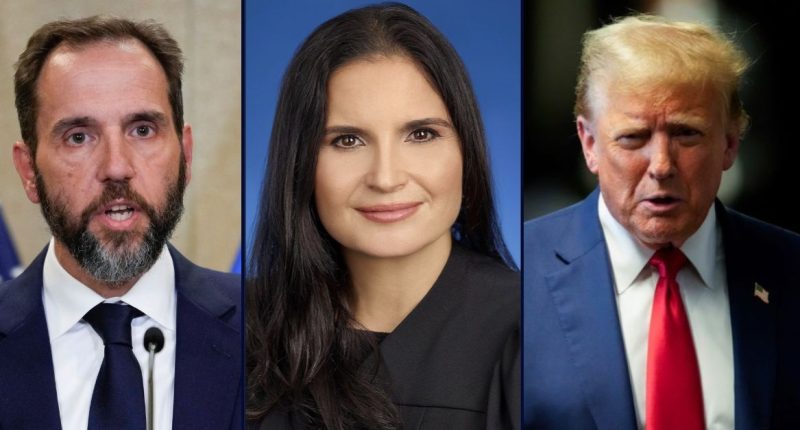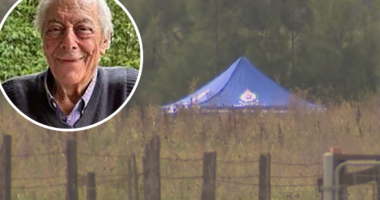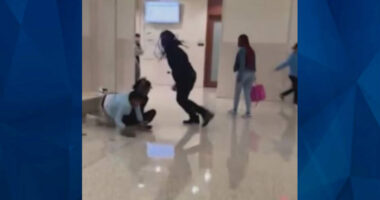Share this @internewscast.com
Left: FILE – Special counsel Jack Smith addresses the media regarding an indictment against former President Donald Trump on Aug. 1, 2023, at a Department of Justice office in Washington (AP Photo/J. Scott Applewhite, File). Center: U.S. District Judge Aileen Cannon (U.S. District Court for the Southern District of Florida). Right: Donald Trump talks to the media before leaving Manhattan criminal court, Monday, May 6, 2024, in New York (AP Photo/Julia Nikhinson, Pool).
On Friday, the U.S. Department of Justice submitted a motion to dismiss a Freedom of Information Act (FOIA) lawsuit seeking to uncover the second volume of former special counsel Jack Smith’s concluding report on the Mar-a-Lago investigation related to President Donald Trump.
The underlying litigation is a relatively terse five-page lawsuit filed in January by The New York Times and one of their reporters.
The plaintiffs claim that the DOJ did not comply with the legal timeline to give a decision on expedited processing of their FOIA request for the second volume of Smith’s report.
Now, the Trump administration, in no uncertain terms, wants to wash its hands of the matter and have the lawsuit dismissed. The filing also offers itself as, in the alternative, a motion for summary judgment.
Love true crime? Sign up for our newsletter, The Law&Crime Docket, to get the latest real-life crime stories delivered right to your inbox.
To hear the government tell it, those same hands are tied – by an injunction issued on Jan. 21, by U.S. District Judge Aileen Cannon in response to an emergency motion to enjoin the release of the second volume filed by Waltine “Walt” Nauta, Trump’s personal valet, and Carlos de Oliveira, Mar-a-Lago’s chief of maintenance.
The district court’s order enjoins:
Attorney General Garland or his successor(s), the Department of Justice, its officers, agents, officials, and employees, and all persons acting in active concert or participation with such individuals . . . from (a) releasing, sharing, or transmitting Volume II of the Final Report or any drafts of Volume II outside the Department of Justice, or (b) otherwise releasing, distributing, conveying, or sharing with anyone outside the Department of Justice any information or conclusions in Volume II or in drafts thereof.
And the injunction, the DOJ says, is the long and short of the case.
“The Times fails to state a plausible claim for relief under FOIA,” the 15-page motion to dismiss reads. “It is clear from the face of the amended complaint that DOJ did not ‘improperly’ withhold Volume II, as required to state a FOIA claim. DOJ had no choice but to withhold the document, as Judge Cannon’s injunction bars DOJ from releasing it.”
The Times, for their part, says Cannon simply did not have the authority to issue the injunction in question – and suggest the DOJ knows and/or agrees the scope of relief granted by the Trump-appointed judge was beyond the district court’s power.
“Defendant has improperly denied the Request for the Second Volume,” the Times’ amended complaint filed in late April reads. “Because the injunction in the Criminal Action was made by a court that lacked jurisdiction to issue such an injunction, it was not a proper basis for DOJ to deny release of the Second Volume.”
The government says this argument could lead to legal chaos.
“Even if this Court were to agree with the Times that Judge Cannon lacked jurisdiction to enter the injunction, an order compelling DOJ to release Volume II under FOIA would put the agency in the impossible position of having to decide which of two conflicting court orders to follow,” the motion to dismiss goes on.
To hear the government tell it, a 1980 U.S. Supreme Court case is instructive here.
The motion to dismiss argues that case stands for the proposition that there is “no discretion for the agency to exercise” in situations “where records sought under the FOIA are subject to injunction issued by federal district court.”
“The Times concedes that the injunction remains in place and precludes the exact relief sought in this case: disclosure of Volume II by DOJ,” the DOJ filing continues. “The Court should therefore dismiss the complaint pursuant to Rule 12(b)(6), based solely on the factual allegations in the amended complaint. Alternatively, the Court should grant summary judgment in DOJ’s favor.”
In their amended complaint, the Times takes stock of the procedural nature of the extant case – which was appealed to the 11th Circuit Court of Appeals after Cannon dismissed the charges against Trump.
“At that point, jurisdiction as a matter of law rested solely with the Eleventh Circuit,” the Times argues. “By operation of law, only the Eleventh Circuit could issue an injunction governing the release of the Second Volume. No such injunction was issued by the Eleventh Circuit, and the Injunction issued by the District Court is a nullity. The District Court also lacked jurisdiction to issue the Injunction because there was no live case or controversy before it, as required by Article III of the Constitution.”
Still, the government insists, this is the wrong read.
That’s because, even after the remaining charges in the criminal case were eventually dismissed as to both Nauta and de Oliveira, two other groups intervened to try and directly dissolve the injunction.
That intervention, the DOJ explains, kept the controversy alive – and before Cannon in the Southern District of Florida.
From the motion to dismiss, at length:
[T]his Court should have “no reason to doubt Judge Cannon’s authority to decide whether and to what extent the injunction should remain in place.” There are currently proceedings pending before Judge Cannon regarding this very question. By its terms, Judge Cannon’s injunction was to “remain in effect pending further Court order,” and the parties were directed to submit a joint status report, no later than 30 days after the conclusion of appellate proceedings in the criminal case, “advising of their position” regarding the injunction…When she entered the injunction, Judge Cannon thus explicitly contemplated and directed further proceedings regarding whether and to what extent it should remain in place following the conclusion of the Eleventh Circuit appeal. And as noted, two organizations (American Oversight and the Knight First Amendment Institute) have sought to intervene in the criminal action to seek dissolution or rescission of the injunction. Thus, “Judge Cannon has before her the question of how the current posture of the criminal case and the facts affect the injunction she entered.”













